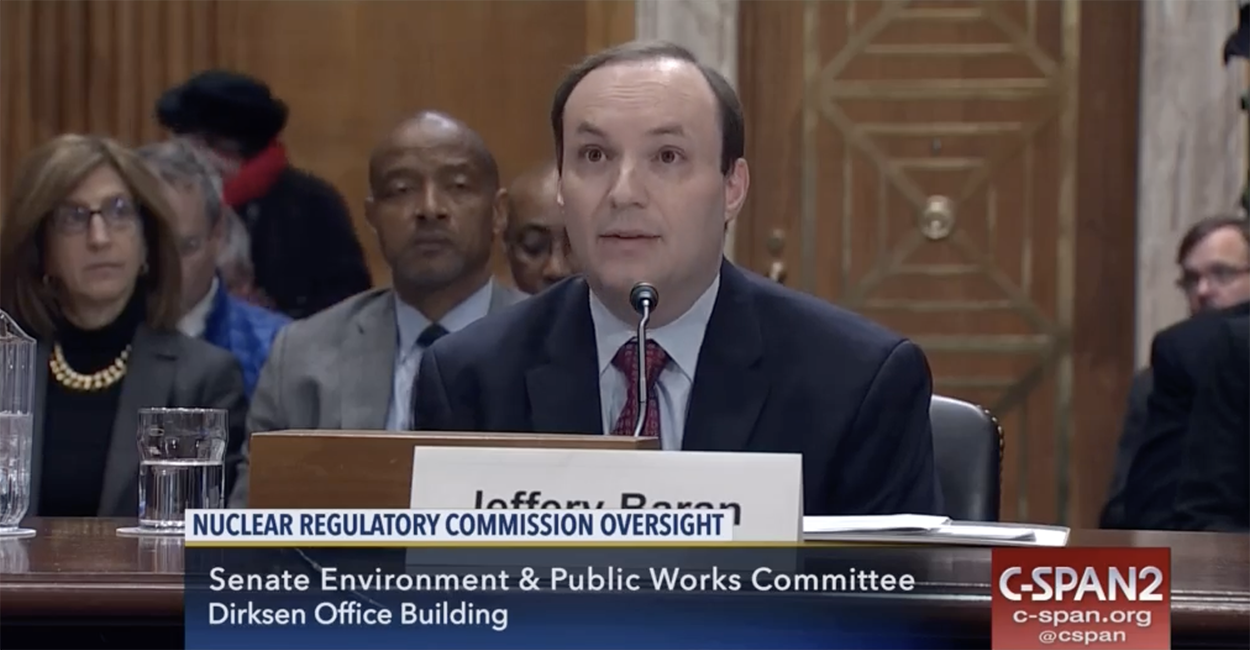


Jeff Baran, a member of the Nuclear Regulatory Commission, failed to secure enough support in the Senate to keep his job when his term expired in June 2023, but he found another job in the federal bureaucracy and stuck around long enough to take the buyout offer under the Trump administration.
While presidents appoint more than 3,000 people for political positions, the federal government directly employs roughly 2.3 million people, most of whom serve in purportedly nonpolitical, career positions. The Office of Personnel Management tracks when political appointees transition to career positions—a process often referred to as “burrowing in” to the bureaucracy—and Baran did so last year.
OPM approved on Sept. 8, 2024, Baran’s transition from a commissioner on the Nuclear Regulatory Commission to become deputy assistant secretary for waste and minerals management at the Department of Energy. He went from making $165,300 annually to $193,819 annually.
Baran took President Donald Trump’s offer of “deferred resignation,” which allows bureaucrats to receive their paychecks through Sept. 30 without doing any work, as an incentive to leave the government early. Exchange Monitor reported on Feb. 20 that Baran accepted the offer.
Baran is likely to receive his paycheck for about 7 months without doing work, costing the taxpayer approximately $113,061.08.
The Biden White House renominated Baran to the Nuclear Regulatory Commission, a quasi-independent federal agency that oversees the use of radioactive materials, in 2023. Baran had held a seat on the five-person panel overseeing the agency since 2014, when President Barack Obama nominated him. Trump renominated him in 2018.
Baran’s nomination died secretly in the Senate, according to the Huffington Post. About four senators who caucused with Democrats, including Sens. Joe Manchin, D-W.Va., and Kyrsten Sinema, I-Ariz., either planned to vote against Baran or refused to pledge their votes for him, a source told the Huffington Post.
The Breakthrough Institute, a California-based think tank that took credit for Baran’s failure to get reconfirmed, faulted Baran for having “paid lip service” to supporting nuclear energy technologies but argued that his “voting record on the commission tells a different story.”
“Baran has consistently voted against proposals to revise [commission] rules to accommodate advanced reactor technology,” the institute claimed. “He was the sole vote on the commission against changes to [commission’s] siting rules that would allow small advanced reactors to be deployed at retiring coal plants and against changing emergency planning requirements to reflect reduced accident risk associated with advanced reactors.”
The institute further noted that Baran joined the commission after serving on the House Energy and Commerce Committee under then-Rep. Henry Waxman, D-Calif., whom the institute described as a long-time opponent of nuclear power.
“It is my job to focus on nuclear safety and security,” Baran told the Senate Environment and Public Works Committee in 2017 at his reconfirmation hearing. “It is not my job to weigh in on the pros and cons of the merits of nuclear power.”
Baran’s decision to take another government job after losing his reconfirmation battle is emblematic of the process by which political appointees “burrow in” to the federal bureaucracy.
While Baran decided to take Trump’s buyout offer, many “burrowers” have not.
A recent poll found that 75% of Washington, D.C.-based federal employees making $75,000 or more per year who voted for Democrat presidential nominee Kamala Harris in November said they would not follow a lawful Trump order if they considered it bad policy.
While some political appointees who took “career” positions may faithfully work for the U.S. government under any president, this poll suggests that some staff inside the federal government may work against the goals of the current president, in this case, Trump.
Federal workers enjoy workplace protections that make them very difficult to fire. The new administration is seeking to reform these rules to enable the president to fulfill his duties as head of the executive branch without facing opposition from hostile bureaucrats.
Although Baran is no longer working in the government, his decision to “burrow in” nonetheless cost taxpayers more than $100,000.
Neither Baran nor the Nuclear Regulatory Commission nor the Department of Energy responded to The Daily Signal’s request for comment.
This is the latest in a series on bureaucrats burrowing in. Part one covers eight appointees. Part two focuses on a former Russiagate adviser who works at the Federal Aviation Administration. Parts three and five expose a former lawyer for then-Sen. Kamala Harris who advised Harris during the confirmation hearings for Supreme Court nominee Brett Kavanaugh and who now works at the Defense Department. Part four focuses on a former Biden campaign lawyer who now works at the Justice Department.
